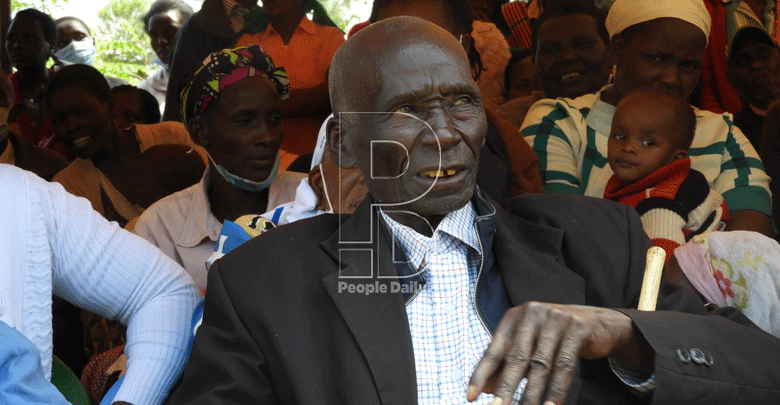Lost Bureti man returns home after 57 years

There was jubilation on Monday after an octogenarian who went missing 57 years ago was re-united with his family at Sebetet village in Bureti sub-county, Kericho county.
Mzee Simon Kipsigei Mibei Chumo, 85, received a heroic welcome with his ecstatic family and villagers staging a feast befitting a king to welcome their long-lost kin.
A bull was slaughtered for the villagers and family to feast as they received Mibei, who many thought had disappeared without a trace.
His wife, Lydia Chepng’eno Mibei, daughter Juliana Chepkirui and Mibei’s grand-children-Rendy Kimutai, Deborah Chepkoech and Jackline Chelang’at shed tears of joy the moment the “lost” Mibei returned alive and kicking.
Lydia, 78, could not believe her eyes when she saw her husband alight from a convoy of cars that had escorted Mzee home after missing for over five decades.
Dead or alive
Lydia and the rest of the family have been searching for Mibei for years in vain, saying when they were about to lose hope, God brought him back home.
“We are grateful to God for having taken care of my husband for the duration he has been away.
We have searched for him everywhere and as we were about to lose hope God has brought him back home,” she added.
A family member, Andrew Lang’at, former councilor at the defunct Litein Town Council, revealed that they have searched for Mibei in several parts of the country.
He says they have been to Nandi, Machakos, Kisumu and even Nairobi counties with one determination; to find him alive or dead.
“We wanted him back home dead or alive. That is why we mounted the search like never before.
We did not want a curse to befall on the family and the entire clan of Kibasisek.
It is curse to the family and the clan to abandon a kinsman until he/she dies and buried at unknown place,” Langat explained.
He discloses that they finally traced the whereabouts of Mzee Mibei to Satiet village in Konoin sub-county in the neighbouring Bomet County.
The Octogenarian was traced to the home of Pastor Erick Bett of Elohin Church where he had been employed as a casual labourer.
His duties entailed herding livestock, weeding, splitting firewood among other chores.
Lang’at revealed that Pastor Bett and the faithful had heard that a missing person from Sebetet, who matched the description of Mibei had gone missing where they contacted his (Mibei) family.
“We went to Pastor Bett’s home three weeks ago and we identified Mibei as our lost “son”. We immediately hit the ground running organising his homecoming ceremony, which indeed has come to pass.
We thanked Satiet’s villagers and the church for cooperating with us and even plan to escort Mibei in convoy of vehicles up to right here (Sebetet village).” Lang’at added.
The reason for his disappearance from the village (Sebetet) in 1964 remains a mystery as Mibei wife’s says he had just stepped out one evening never to be seen or heard from again.
Chepng’eno recalls that that fateful day, they had just retired to bed when Mibei left never to return.
“We were living happily as a newly married couple. We ate supper as usual that fateful day. He never looked troubled. He just left for unknown place without telling me anything,” she says.
“I have been having sleepless nights all through thinking of what could have made him take a bold decision to desert his us, and more so a young family then.
And what might have happened to him,” Chepng’eno added while holding back tears.
Sleepless nights
Mibei was said to have disappeared when the wife had just given birth to their first-born and an only child, Juliana Chepkirui, 57.
Chepkirui is a mother of three.
When asked what transpired, Mibei simply says he left home in search of a job and that he was once employed by a white man at Sotik town in Bomet as a cook. Mibei left the villagers mouths agape when he claimed to have been to Israel, Egypt, Ghana and Democratic Republic of Congo on a mission he did not disclose.
When pinned down to explain further how he got to those countries he declined. Later in 1972, he went to Konoin sub-county, where many tea farmers employed him as a tea picker until he grew too old to discharge his duties.
Chepkirui was overjoyed to meet her father for the first time in her life. She was an infant when her father left.








